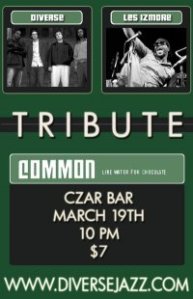By Joel Francis
The Daily Record
Mark Lowrey sits behind a grand piano, contemplating using a Thelonious Monk number as an introduction to the rapper Common’s song “Thelonious.” As his fingers coax a signature Monk melody from the keys, bass player Dominique Sanders and drummer Ryan Lee nod in approval.
“I thought it was really obvious at first,” Lowrey admits. “But sometimes obvious is good.”
Two days before Thanksgiving, Lowrey and his rhythm section are sorting through ideas, sketching a musical landscape. They are joined by singer Schelli Tolliver and MCs Les Izmore and Reach. The final vision – a bridging of jazz and hip hop, structured and improvised – will be displayed tonight at Crosstown Station. The Black Friday ensemble takes the stage at 10 p.m. Cover is $10.
“We’ll be doing a mix of originals and covers,” says trumpet player Hermon Mehari, who will also be participating. “We’re playing tribute to some of the great hip hop artists of our time like Talib Kweli, A Tribe Called Quest, J Dilla. Additionally, Reach and Les will both do some originals.”
After a few trials, the Monk number “I Mean You” has been successfully married to “Thelonious.” On “The Light,” another Common song, the band suddenly drops into Michael Jackson’s “Human Nature” right after the lyric “It’s kinda fresh you listen to more than hip hop.”

“When Les and Diverse played this (‘The Light’) earlier this year they did ‘Unforgettable’ in that spot,” Lowrey says. “Everybody liked that, but we didn’t want to use the same thing. We were tossing out ideas, and someone suggested Michael Jackson.”
That same process informed the playlist. Everyone presented the songs they wanted to do, and the set was culled from what worked and how the band’s reactions. When Reach takes the mic for Notorious B.I.G.’s “Big Poppa” he intersperses short bursts of freestyle around the original lyrics. A later run through of Jay-Z’s “Show Me What You Got” reveals an energy only hinted at on the Top 10 single. As Reach commands the imaginary crowd to wave their arms, Lee goes berserk on his drum kit.
“These shows have a different energy than Hearts of Darkness,” Izmore says of the local Afrobeat group he fronts. “With those shows you’re always trying to keep people dancing and keep the energy high. Here you can chill out and listen.”
Rehearsals will soon move to Crosstown Station, but for tonight the Mutual Musicians Foundation is home. The hallowed hall on Highland, home to Hootie and Bird, Count Basie and Big Joe Turner. The spirit of innovation those musicians introduced to the world via Kansas City is very much on display in the current sextet. Some may scoff that jazz and hip hop may seem to exist on disparate planets, but their orbits collide surprisingly often.
“I grew up on jazz, John Coltrane, Stan Getz, Ella Fitzgerald,” Reach says. “She (Ella) very much influenced my delivery and the way I play with cadences.”
Lowrey first toyed with combining rap and hip hop when he invited local MC Kartoon to sit in with his group a couple years ago. Both artists enjoyed the experience and Kartoon put Lowrey in touch with other vocalists in the KC hip hop scene.
“Hip hop has always been influenced by jazz,” Reach says. “Now, because the younger jazz musicians have grown up with hip hop, we are seeing it influence jazz. It’s kind of come full circle.”
In the past year, Lowrey has hosted several Mark Lowrey vs. Hip Hop concerts. The shows are basic, but explosive. Lowrey and drummer Brandon Draper create free jazz textures, as MCs and musicians alike improvise over the ever-changing structure.
“Our arrangements for this show are based in the tradition of jazz where you play the melody, then improvise over the chords before coming back to the head (melody),” Lowrey says. “The only difference is that we’re adding MCs in the mix with the horns.”
At another jazz/hip hop mash-up last February, Izmore and Diverse, a local jazz quartet that includes Mehari and Lee, celebrated the 10th anniversary of Common’s album “Like Water For Chocolate” by rearranging and performing the record in its entirety. The night ended with an encore of the Charlie Parker song “Diverse.”
“I’ve never seen a crowd of non-jazz fans so into the music,” Mehari says. “It’s the perfect example of what we want to do. Bring people in with hip hop and music they want to hear, then take them on a journey to new sounds. Once we’ve earned their trust, they’ll follow us anywhere.”
Keep reading:
KC’s MCs throw down this weekend



